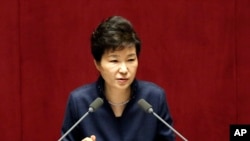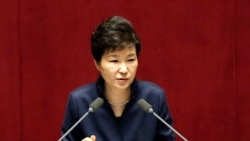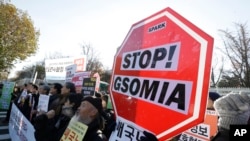South Korean President Park Geun-hye awaits an uncertain political fate as her impeachment is adjudicated by the country’s Constitutional Court. While an overwhelming number of South Koreans want her removed from office, it’s unclear how these events will impact Park’s programs, like the controversial “comfort women” agreement with Japan, the bilateral intelligence-sharing pact with Tokyo, and deployment of Terminal High-Altitude Area Defense (THAAD), a United States high-altitude missile defense system.
THAAD opposition
The opposition Minjoo Party would like to see the THAAD system delayed until after a new president is selected, or perhaps indefinitely, but acting President Hwang Kyo-ahn says the advanced anti-ballistic missile system should be deployed as soon as possible.
Katharine Moon, a non-resident fellow at the Brookings Institution and professor at Wellesley College, says the “proceedings have expedited the plans to install THAAD. That’s just the bottom line ... because people don’t know what will happen in the coming months."
Moon says that may open an opportunity for opposition presidential candidate Moon Jae-in to change the agreement with the U.S. regarding THAAD implementation.
Daniel Pinkston, a lecturer on international relations at Troy University, notes there’s a huge difference between criticizing those in charge and being in charge yourself.
“When someone becomes president and is responsible for the territorial integrity of the Republic of Korea, the safety and security of the people, and all assets in the country … that’s quite a serious responsibility; quite a solemn responsibility,” said Pinkston who adds that there’s been an unmet burden of proof by those opposing THAAD that its absence increases South Korean security.
Japan intelligence-sharing pact opposition
In November, South Korea and Japan signed an intelligence-sharing pact — something that was originally supposed to go into effect in 2012, but was scrapped due to domestic opposition. The new deal has also faced criticism; however, the bilateral agreement has already started.
“I understand the resentment from the colonial period and so forth,” said Pinkston, “However, on the other hand, these agreements are pretty standard. It only provides for a channel or a mechanism to share sensitive information, to protect that information, and to protect the sources and methods.”
Katherine Moon agreed, noting, “It’s in place, it’s working and, in truth, both countries benefits immensely.” She highlighted how the deal allows for “the superiority of [South] Korea’s human intelligence gathering capabilities to marry with Japan’s satellite and other technological capabilities.”
Moon also highlights that the pact excludes top secret information, something that South Koreans objecting to the deal may gloss over.
Pinkston says that South Korea has many such agreements in place, and this one doesn’t require that Seoul do anything and that it only provides a channel of communication to Tokyo. Pinkston adds that if there was a threat from North Korea and Japan had valuable intelligence, “I don’t understand why any leader or government official who’s responsible for the security of South Korea would refuse that information.”
2015 'comfort women' deal
Perhaps one of the more controversial policy decisions made by the Park administration took place in 2015, when it agreed to finally and permanently resolve the diplomatic issues regarding South Korea’s “comfort women.”
Opposition presidential candidate Moon Jae-in said December 15 that he believes further talks over Japan’s legal responsibility need to occur with Japan and that an official apology must be made.
“The ‘comfort women’ issue is a deep-seated one,” says Katherine Moon, “But there’s also this reality, no matter what, in my opinion, Japan were to do, in order to make amends with South Korea, I don’t think you would find 100 percent of South Koreans ever happy.”
Pinkston also notes there exists a number of political actors in both South Korea and Japan who use this particular issue for personal political agendas, and in his view, he explains on Skype, the situation wasn’t resolved satisfactorily.
“I think the way it was handled was insufficient," he said. "I think from a humanitarian perspective, I think the most important thing is to address the feelings and concerns and human rights abuses of these survivors suffered so many decades ago.”
While the South Korean Constitutional Court must arrive at its conclusion on Park’s impeachment within 180 days, the fate of her public policy may remain unknown for an indiscriminate amount of time.
















